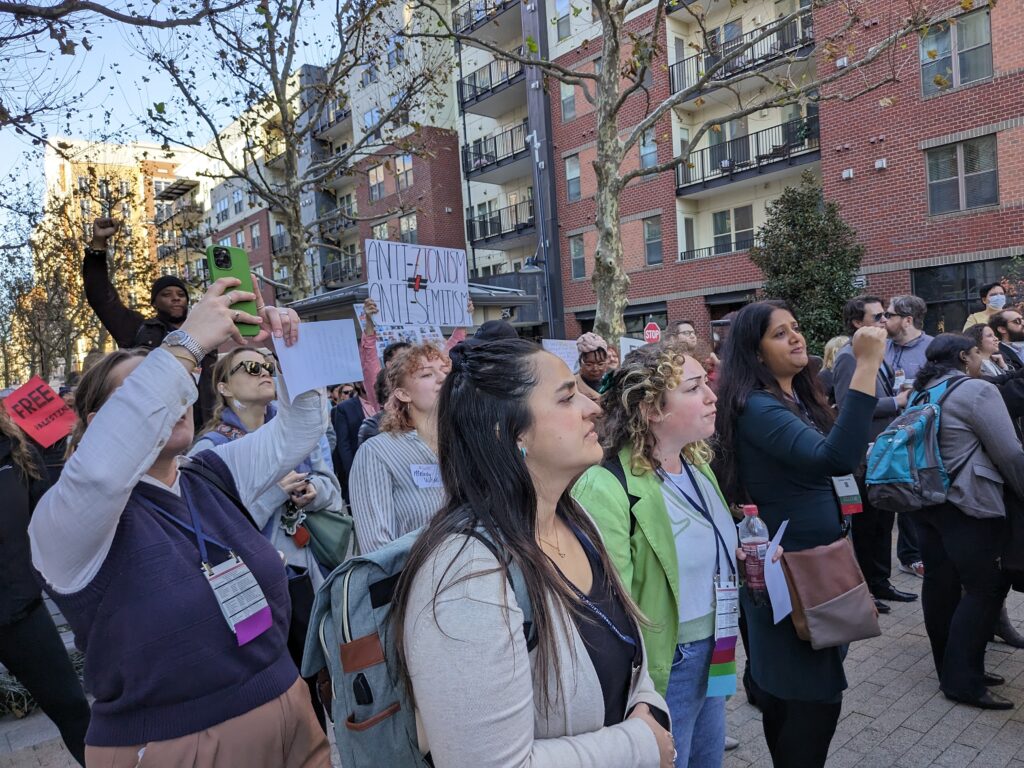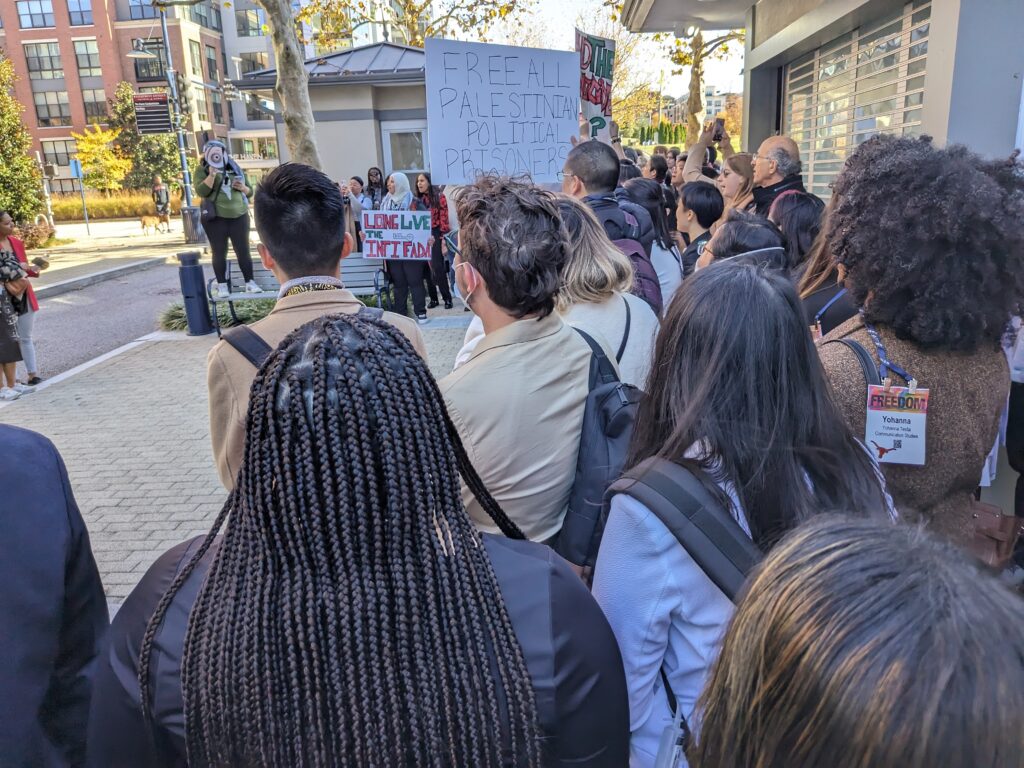Academics protest Gaza genocide, face a clampdown on academic freedom
Report from the front

An academic convention is perhaps the last place where you would expect to find a militant protest and defiance against institutional authority. But this is what happened at the National Communication Association (NCA) convention on November 17 in Washington, D.C. Ironically, given the events that would unfold, the theme of the conference was “Freedom.”
The NCA conference brings together thousands of communication scholars from across the country. The president of the Association is a Palestinian-American communication scholar named Walid Afifi. He was elected into this position well before the current conflict in Gaza.
The unfolding genocidal catastrophe of Israel’s attack on Gaza provided an opportunity for him to speak out. Other members of the association organized impromptu convention sessions on Palestine and a walkout, march, and rally.
On Saturday, a group of about three hundred students and faculty gathered and marched out of the elite Gaylord resort and conference center in support of Gaza. We spilled out into Washington, D.C.’s National Harbor, a highly artificial and bourgeois area featuring shops, restaurants, and bars along the quaint but fabricated streets in Washington, D.C. I’m sure that the vacationers and holiday shoppers were alarmed to see hundreds of people chanting and carrying signs marching down the quaint streets of this resort. However, march and chant we did.
Chanting “Ceasefire now!” and “Free-free Palestine!”, the demonstrators, who ranged from undergraduate students through senior faculty and representing a very diverse subsection of the academic association, moved through the streets, stopping at intervals to hear speeches from students and Palestinians condemning Israel’s attack on Gaza. Speakers implicated the United States and its aid to Israel in the genocide and connected events in Gaza with settler colonialism in the United States and elsewhere.

That evening, Professor Afifi was scheduled to deliver his presidential address. He had arranged it as a collective performance protesting the association’s quiescence with regard to Palestine and other social justice issues and calling on the organization to continue the process, underway for several years, of diversifying membership, increasing inclusion and accessibility, and elevating scholars of color into leadership positions across the organization.
Palestinian members of the association were scheduled to speak during the event about the horrific situation unfolding in Gaza, where more than 14 thousand people have been killed to date, including thousands of children.
One of the presenters was Professor Ahlam Muhtaseb, a Palestinian on the faculty of California State University, San Bernardino. She had vetted her remarks with the national leadership of NCA on November 13. But on November 17, someone in the Association decided that her speech was unacceptable, as it mentioned genocide and colonization with regard to Israel’s brutal assault on Gaza. The leadership of the Association intervened to stop the address from happening, and Afifi and the rest of the presenters joined her in solidarity.
When told they would be removed by security, the group moved onto the plaza outside of the ballroom, chanting and assembling to continue the performance with a greater sense of outrage and urgency. The loud and defiant event competed for attention with the rehearsal of a Christmas performance by Cirque du Soleil. Then, security officers hired by NCA disrupted the performance.
The growing group of hundreds of Association members moved into an empty ballroom and occupied it to complete the performance.
Everyone was left reeling, and members vowed to challenge the association leadership, call for the resignation of the person who decided to cancel the event, and implement other measures in response to this heinous abuse of administrative power and attempt at censoring critical public conversation about Palestine and protest against Israel’s assault.
In addition to being an authoritarian act motivated by Zionism, the Association’s attempt to silence Professor Muhtaseb was a grave assault on academic freedom.
A group of NCA members is circulating a letter of protest, writing,
We are deeply concerned about this gross violation of participants’ academic freedom and freedom of expression at an academic conference, paradoxically organized around the theme of “”Freedom.” We are especially concerned that NCA has upheld and perpetuated strategies of Zionism and Islamophobia by silencing Palestinians who are witnessing the ongoing genocide in Gaza.
The signatories of the letter are demanding that NCA investigate its practices around free speech in general and the decision-making process surrounding the censorship of Professor Muhtaseb. The letter also demands that NCA offer Professor Muhtaseb and other participants a formal apology and create transparent and nondiscriminatory processes to make sure such censorship of free speech will not happen again. Finally, the letter asks the Association to provide a platform for the disrupted performance.
As one participant put it, “There is a profound irony in a communication association shutting down communication about a situation of global urgency–especially when we are here to honor the theme of freedom.”
Update: The NCA issued an apology to Professors Afifi and Muhtaseb and to the membership and indicated that it would investigate the incident.

Featured image credit: iCephi; modified by Tempest
Categories
We want to hear what you think. Contact us at editors@tempestmag.org. And if you've enjoyed what you've read, please consider donating to support our work:
DonateDana Cloud View All
Dana Cloud is a Tempest Collective member and scholar of Marxism, popular culture, and social movements currently teaching at California State University, Fullerton.
